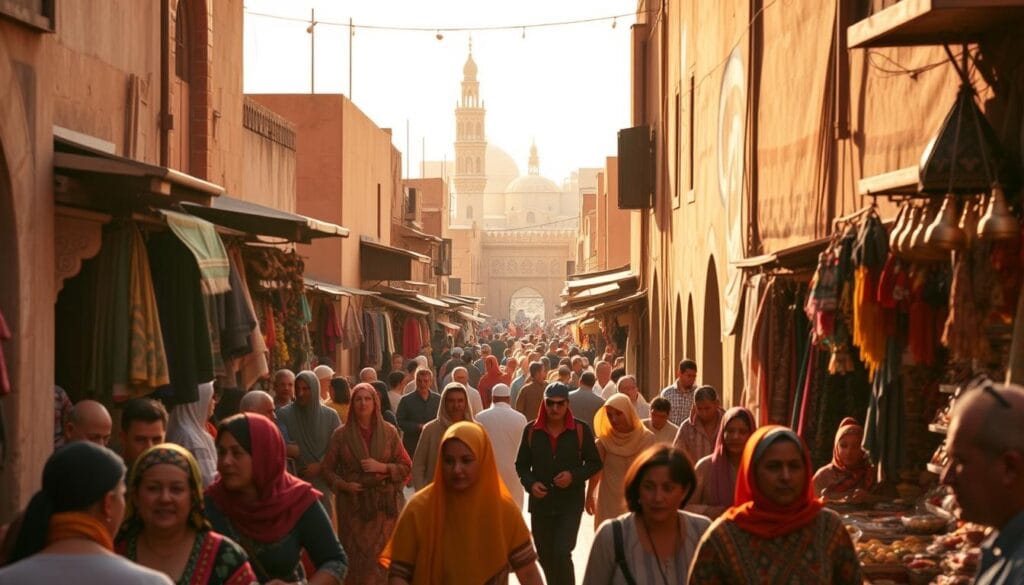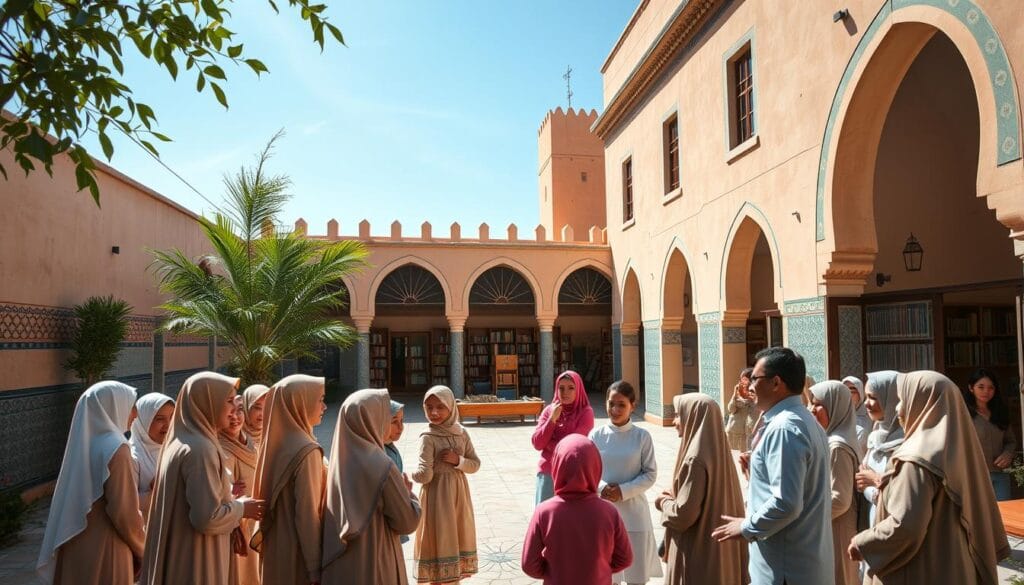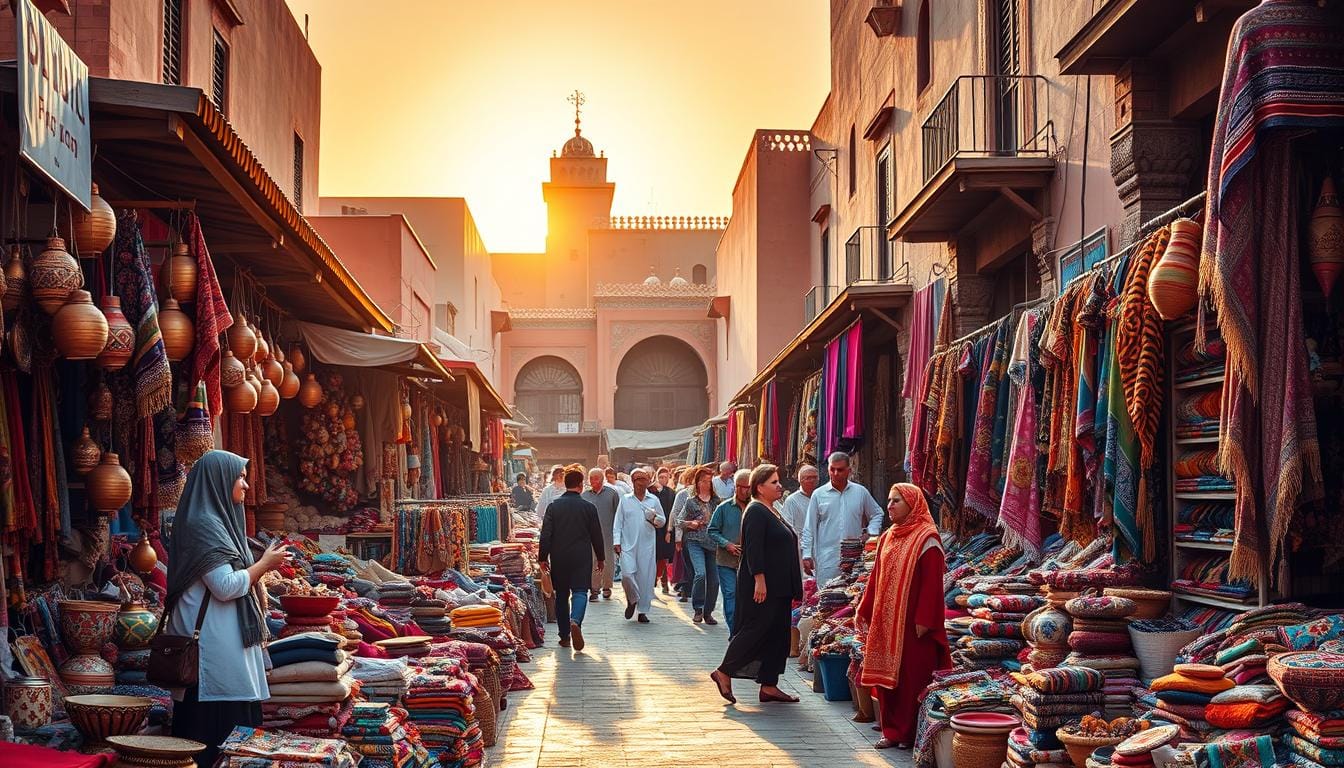What Is Life Like in Morocco? A Practical Guide for Newcomers
What Is Life Like in Morocco. As you consider moving to Morocco, you’re likely to wonder what life is really like in this vibrant North African country. Moroccan culture offers a unique blend of traditional and modern ways of life, making it an exciting and challenging place to live.
In this guide, we’ll walk you through the essentials of living in Morocco, from cultural norms and daily life to practical considerations like housing and healthcare. Whether you’re planning to retire, work, or study, this guide will help you navigate the ups and downs of travel and settling in Morocco.
What Is Life Like in Morocco: Key Takeaways
- Understanding Moroccan culture and its impact on daily life
- Practical considerations for housing and healthcare
- Insights into cultural norms and social etiquette
- Tips for navigating everyday challenges in Morocco
- Information on the best places to live, work, and study
Table of Contents
ToggleCultural Overview of Morocco
As you step into Morocco, you’re immediately enveloped in a rich cultural tapestry woven from Berber, Arab, and French influences. This diverse heritage is reflected in various aspects of Moroccan life, making it a fascinating place to explore.
Traditions and Customs
Moroccan traditions are deeply rooted in its Islamic heritage and cultural norms. You will notice that many Moroccans adhere to traditional practices, such as the observance of Ramadan and the celebration of Eid al-Fitr. Understanding and respecting these customs is crucial to integrating into Moroccan society.
Some of the key traditions include:
- Hospitality: Moroccans are known for their warm hospitality, often greeting guests with traditional tea.
- Respect for Elders: Older individuals are highly respected in Moroccan culture, reflecting the importance of family and community.
- Cultural Festivals: Morocco hosts various cultural festivals, showcasing its rich heritage through music, dance, and art.
Language and Communication
Language plays a vital role in Moroccan culture, with Arabic being the official language. French is also widely spoken, particularly in formal and business contexts. Berber dialects are spoken by the indigenous Berber communities.
Effective communication in Morocco involves:
| Language | Usage | Importance |
|---|---|---|
| Arabic | Official and daily communication | High |
| French | Business, education, and formal contexts | High |
| Berber | Indigenous communities | Moderate |
Culinary Influences
Moroccan cuisine is a delicious reflection of the country’s cultural melting pot. Influenced by Berber, Arab, and French culinary traditions, Moroccan dishes are known for their rich flavors and aromas.
Some popular Moroccan dishes include:
- Tagines: Slow-cooked stews named after the clay pots in which they are cooked.
- Couscous: A traditional North African dish made from semolina flour, often served with vegetables and meat.
- Pastilla: A savory pie made with layers of flaky pastry, meat, and spices.
Moroccan cuisine is not just about the food; it’s an experience that brings people together, reflecting the country’s warm hospitality and cultural richness.
Living Arrangements in Morocco
As you plan your move to Morocco, understanding the local housing market is crucial. Morocco offers a diverse range of living arrangements that cater to different lifestyles and preferences, from modern apartments in bustling cities like Marrakech and Casablanca to traditional riads and rural homes.
Types of Housing Options
Morocco’s housing options are as varied as its landscapes. In urban areas, you can find modern apartments equipped with all the amenities you need. These apartments are often located in secure buildings with services like swimming pools and gyms. In contrast, traditional riads offer a glimpse into Morocco’s rich cultural heritage, with their intricately decorated interiors and serene courtyards.
Rural Housing: If you prefer a more tranquil environment, rural homes are available, often surrounded by natural beauty. These homes can range from simple cottages to larger villas.
Cost of Living Considerations
The cost of living in Morocco can be relatively low compared to Western countries, but it’s essential to consider factors like location, amenities, and lifestyle when choosing your housing. For instance, living in a city like Marrakech or Casablanca might be more expensive than in smaller towns or rural areas.
| Location | Average Rent | Amenities |
|---|---|---|
| Marrakech City Center | $500-$1000/month | Pool, Gym, Security |
| Rural Areas | $200-$500/month | Simple, Traditional |
| Casablanca | $400-$900/month | Modern, Secure Buildings |
When researching housing, consider proximity to public transport, local amenities, and community services. This will not only enhance your living experience but also potentially increase the value of your property.
Navigating Moroccan Cities
Navigating the cities of Morocco can be a thrilling experience, with various transportation options at your disposal. Moroccan cities are a blend of old and new, with ancient medinas alongside modern infrastructure.
Public Transportation Systems
Morocco’s cities are well-connected by public transportation systems, including buses and trains. The ONCF (Office National des Chemins de Fer) operates the train network, providing efficient and relatively affordable travel between major cities like Marrakech, Fez, and Rabat.
- Trains are modern and comfortable, with options for first and second class.
- Bus networks cover more areas, including rural regions, and are operated by companies like CTM (Compagnie de Transports au Maroc).
For shorter distances, petit taxis (small taxis) are readily available and affordable, while grand taxis operate on fixed routes and are a good option for slightly longer journeys.
Walkability and Biking
Many Moroccan cities are highly walkable, especially within the medinas, where narrow streets and alleys invite exploration on foot. Biking is also a viable option, offering a unique perspective on the urban landscape.
“The medinas of Morocco are labyrinthine and full of life, making every walk a discovery.”
For those who prefer cycling, many cities have bike rental services, and some are starting to implement bike lanes to enhance safety and encourage this eco-friendly mode of transport.

As you navigate these vibrant cities, you’ll discover that each has its own character, from the bustling souks to the serene gardens and palaces. Whether you’re commuting or exploring, Morocco’s cities offer a dynamic and engaging lifestyle.
Social Life and Community
As you settle into life in Morocco, you’ll discover that the country’s warm hospitality makes it easy to build a social life. Moroccans take great pride in their culture and traditions, and you’re likely to be welcomed with open arms.
Engaging with Locals
Engaging with locals is a great way to immerse yourself in Moroccan culture. Start by learning a few basic Arabic phrases, such as “hello” (مرحبا – marhaba) and “thank you” (شكرا – shukraan). This will not only show respect for the culture but also help you connect with the people.
Moroccans are known for their love of tea, and sharing a cup of mint tea is a common social activity. You can use these moments to build rapport and learn more about local customs and traditions.
Community Events and Festivals
Participating in community events and festivals is another excellent way to experience Moroccan traditions firsthand. Morocco hosts a variety of festivals throughout the year, such as the Marrakech International Film Festival and the Essaouira Gnawa Music Festival.
| Event | Location | Description |
|---|---|---|
| Marrakech International Film Festival | Marrakech | A celebration of cinema from around the world, showcasing new talent and established filmmakers. |
| Essaouira Gnawa Music Festival | Essaouira | A festival celebrating Gnawa music and culture, featuring local and international artists. |
| Mawazine Festival | Rabat | A music festival featuring a diverse lineup of local and international artists. |
These events are not only entertaining but also provide a unique insight into the country’s rich cultural heritage. By attending these festivals, you’ll have the opportunity to meet new people and deepen your understanding of Moroccan culture.
Work Life in Morocco
Navigating the professional landscape in Morocco requires insight into the local work culture and job opportunities. As you consider living in Morocco, understanding the lifestyle in Morocco and how it impacts your work life is crucial.
Job Market Insights
Morocco’s job market is diverse, with significant opportunities in industries such as tourism, finance, and technology. The country’s strategic location and growing economy make it an attractive destination for professionals. When exploring job opportunities, it’s essential to research the local job market and understand the requirements for working in Morocco, including any necessary visas or work permits.
A key aspect of the job market in Morocco is its growing startup scene, particularly in cities like Casablanca and Rabat. These hubs offer a range of opportunities for entrepreneurs and professionals alike. Additionally, Morocco’s tourism industry is a significant employer, with many opportunities in hospitality and related sectors.
| Industry | Job Opportunities | Growth Potential |
|---|---|---|
| Tourism | Hospitality, Tour Guides, Travel Agencies | High |
| Finance | Banking, Investment, Financial Analysis | Moderate |
| Technology | Software Development, IT, Data Analysis | High |
Workplace Culture and Etiquette
Workplace culture in Morocco tends to be formal, with an emphasis on respect for hierarchy and authority. Building relationships with colleagues and understanding local business etiquette can help you navigate the workplace effectively. Greetings are an important part of Moroccan culture, and it’s customary to greet colleagues and superiors with a handshake or a kiss on the cheek, depending on the level of familiarity.
Understanding the nuances of communication in the Moroccan workplace is also vital. Communication styles can be indirect, and it’s essential to be aware of non-verbal cues and to show respect through your demeanor and body language.
As you adapt to the lifestyle in Morocco, embracing the local work culture will enhance your professional experience. By understanding the job market and workplace etiquette, you can make the most of your time in Morocco and enjoy a fulfilling work life.
Education System in Morocco
As you explore Morocco, you’ll discover a diverse education system that caters to various needs and preferences. The country has made significant strides in improving its educational infrastructure, offering a range of options for families.
Schooling Options for Children
Morocco provides a variety of schooling options for children, including public, private, and international schools. Public schools are widely available and offer a curriculum that aligns with Moroccan standards. Private schools, on the other hand, often follow international curricula, such as the French or American systems, and may offer bilingual or multilingual education.
International schools are another popular choice, especially for expatriate families, as they provide a curriculum that is recognized globally, such as the International Baccalaureate (IB) program. These schools often have diverse student bodies and offer a range of extracurricular activities.
| School Type | Curriculum | Language of Instruction |
|---|---|---|
| Public | Moroccan | Arabic, French |
| Private | International (e.g., French, American) | French, English |
| International | Global (e.g., IB) | English, others |
Higher Education Institutions
Morocco is home to several reputable higher education institutions, including universities and specialized schools. These institutions offer a wide range of programs in fields such as business, engineering, humanities, and social sciences.
Some of the prominent universities in Morocco include the University of Mohammed V in Rabat and the University of Cadi Ayyad in Marrakech. These universities attract students from across the region and offer various undergraduate and graduate programs.
“Morocco’s strategic location makes it an ideal hub for students looking to explore the African, European, and Arab worlds.”
Specialized schools and institutes in Morocco focus on areas like technology, management, and the arts, providing students with the skills needed to succeed in their chosen careers. Many of these institutions have partnerships with international organizations, enhancing their programs and research opportunities.

Health Care in Morocco
As you settle into life in Morocco, navigating the healthcare options becomes essential. Morocco’s healthcare system has seen significant improvements in recent years, offering a range of services that cater to different needs.
Medical Facilities and Accessibility
Major cities in Morocco boast modern medical facilities, providing quality care to residents. The public healthcare system is available, although the quality can vary. You can access public hospitals and clinics, which offer a range of services from general practice to specialized care.
Private healthcare is also a viable option, with many medical professionals having received training abroad. Private hospitals and clinics often provide a higher standard of care and shorter waiting times, making them an attractive choice for those who can afford it.
| Facility Type | Services | Accessibility |
|---|---|---|
| Public Hospitals | General practice, specialized care | Widely available |
| Private Hospitals | Specialized care, shorter waiting times | Available in major cities |
| Private Clinics | General practice, some specialized care | Common in urban areas |
Health Insurance Options
Understanding your health insurance options is crucial when living in Morocco. The public healthcare system may not cover all eventualities, making private health insurance a consideration for many expats.
You should research private health insurance providers to ensure you have adequate coverage. Some insurance plans offer comprehensive coverage, including access to private hospitals and clinics, while others may have more limited options.
When choosing a health insurance plan, consider factors such as the level of coverage, deductible amounts, and any exclusions. It’s also worth considering the reputation of the insurance provider and their customer service.
By understanding the healthcare system and your insurance options, you can make informed decisions about your health care while living in Morocco, ensuring a healthier and more secure lifestyle.
Safety and Security Considerations
Safety and security are paramount when exploring Morocco, a country rich in culture and history. As you travel through Morocco, being aware of your surroundings and understanding local customs can significantly enhance your experience.
Crime Rates and Safety Tips
As with any popular tourist destination, Morocco experiences its share of petty crimes such as pickpocketing and scams, particularly in crowded areas and tourist hotspots. To minimize risks, it’s advisable to secure your belongings and remain vigilant in busy environments.
Additionally, respecting local customs and traditions can help you avoid unwanted attention. Dressing modestly, especially when visiting mosques or rural areas, is considered polite and can contribute to a smoother interaction with locals.
- Keep your valuables secure and consider using a hotel safe.
- Be cautious of overly friendly strangers who might be attempting to scam you.
- Familiarize yourself with local customs to avoid unintentionally offending locals.
Emergency Services in Morocco
In the event of an emergency, Morocco has a well-organized system in place, including police, ambulance, and fire services. It’s beneficial to know the local emergency numbers and have a plan in case of an unexpected situation.
For non-emergency situations, such as needing information or assistance, contacting your country’s embassy or consulate can provide valuable support and guidance.
Key Emergency Contacts:
- Police: 19
- Ambulance: 15
- Fire Department: 18
By being informed and prepared, you can enjoy a safe and fulfilling experience in Morocco, immersing yourself in the rich Moroccan traditions and contributing to the vibrant Morocco tourism industry.
Tips for Newcomers to Adapt
Adapting to life in Morocco requires a combination of cultural integration strategies and practical know-how. As you settle into your new surroundings, you’ll discover that embracing the local culture is key to a smooth transition.
Practical Strategies for Cultural Integration
Learning a few basic Arabic phrases can go a long way in making your experience more enjoyable. Understanding local customs and being open to new experiences will also help you navigate everyday challenges. Engaging with locals and connecting with other expats through social events and online communities can help you build a support network, making it easier to adapt to the Moroccan culture.
Essential Resources for a Smooth Transition
Having the right resources and contacts is crucial for navigating lifestyle in Morocco. Research reliable healthcare providers, familiarize yourself with local authorities, and explore available services to make your transition as seamless as possible.

